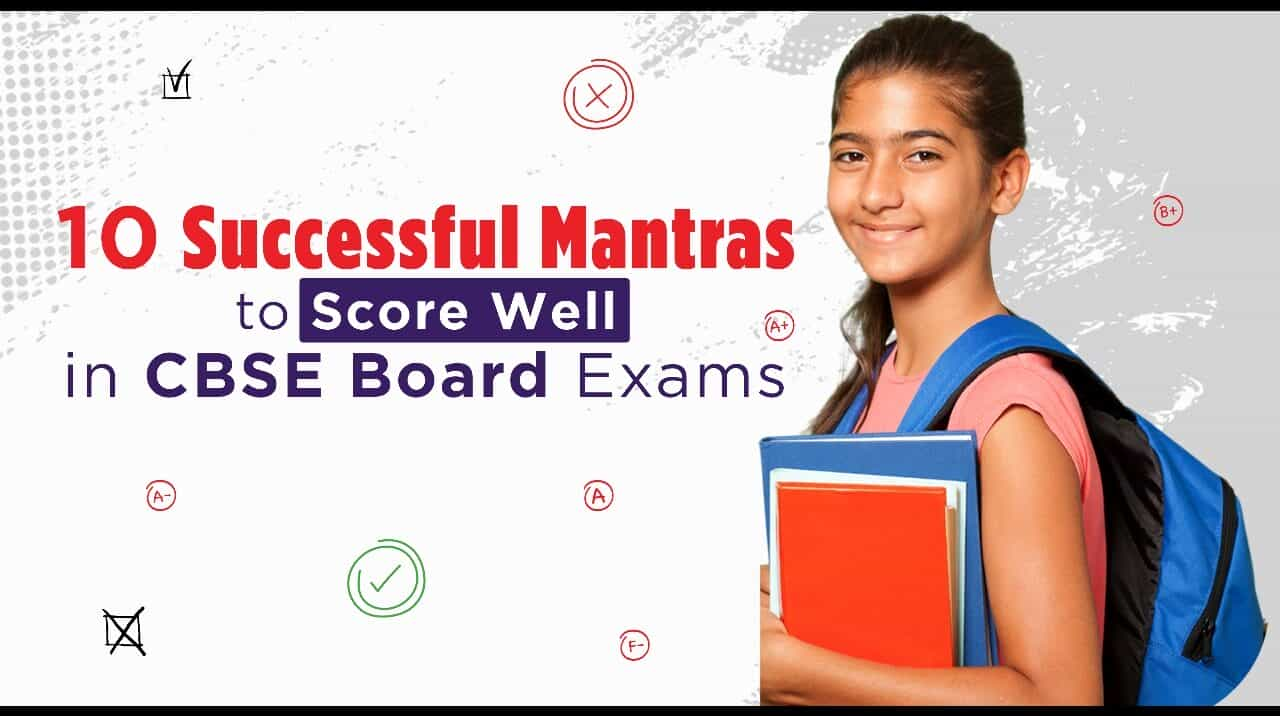“There are no secrets to success. It is the result of preparation, hard work, and learning from failure.” – Colin Powell
No child is a blank slate. Everyone is born with some strengths and some weaknesses. If we can recognize them, nourish our strengths, and overcome our weaknesses, the sky is the limit. Assessments when conducted in the right way, become the means to help us know our strengths and weaknesses. Different kinds of assessments serve as yardsticks differently.
Board exams are yardsticks to measure the academic strength of children. Excelling in these exams is not a herculean task if the focus is on essential and timely preparations.
10 Successful Mantras to Score Well in CBSE Board Exams
Self-awareness: One should be aware of their learning styles, strengths, weaknesses, and willingness to work on the weak areas. Different learning styles include – auditory, visual, kinaesthetic, and reading/writing learners. This can help you find ways that fasten your understanding ability of the given topic.
Goal setting: Set realistic goals based on self-awareness. Divide your goals into short-term and long-term and make them subject-specific. The long-term goal should be the marks you intend to score. Assessing yourself frequently using the previous year’s question papers, and the possible HOTS, LOTS and MOTS (chapter-specific), should help making your goals measurable.
Begin with the end in mind: Based on the number of days available before the commencement of the exams and the set goals, prepare a timetable to cover a certain part of the syllabus every day. Adherence to it is the key requirement. Plan the study timetable to complete the syllabus at least a month before the exam begins. So, one week can be used as buffer time to cover the syllabus (missed if any) and the rest can be utilized for effective revisions.
Essential agreements: Be consistent with the schedule. Note down your distractions and arrive at essential agreements to overcome them. E.g. If cell phone usage is your distraction, do not plan to study anything over the phone. And, if it is inevitable, set rigid rules to help yourself overcome unwanted usage of the same.
Chapter-based study planner: Reading through the textbook, followed by solving the questions from old question papers or question banks will help to understand the weightage of the chapter. Which in turn, will help to devise a strategy to study that particular chapter. E.g., you will be able to understand whether you should focus more on HOTS/LOTS/MOTS from the chapter you are studying. This will also help you to learn the trends of the question paper and will let you invest an appropriate amount of time in the chapters as needed to score well in the examination.
Synopsis: Preparing simplified point-wise notes for the concepts you learn, mind maps, etc., will improve your time management with the 3 R’s – Read, Revise, Repeat. These synopsis can serve as refresher notes on the day before the exams.
Seek help: Always be honest with yourself and your teachers. Accept when you are unable to understand what you are learning and feel free to talk to your teachers and seek guidance from them. They are the right ones to help you rather than spending time searching for solutions elsewhere. Elders/Siblings who have faced any issues during their preparations can guide you in tackling any issues that you are facing.
Mock exams: Whatever your learning style may be, penning down your learnings for 80 marks for three continuous hours is the need. Answering old question papers keeping timers. This will also help you to understand the likely/possible mistakes you may commit during the exams. And possible mistake control measures can be devised.
Break the monotony: Indulge yourself in a recreational/entertainment activity once in a while. Boards can be stressful, and some form of entertainment can help you relieve stress occasionally. But choose your recreational activity wisely. Spend time with your family and share your progress with them.
Believe in yourself: Above all, believe in yourself and your hard work. It is your own belief and confidence that can help you succeed in anything you do.
Success does not come by chance. It is not a result of luck but a result of hard work, dedication, deliberate effort, and perseverance.




